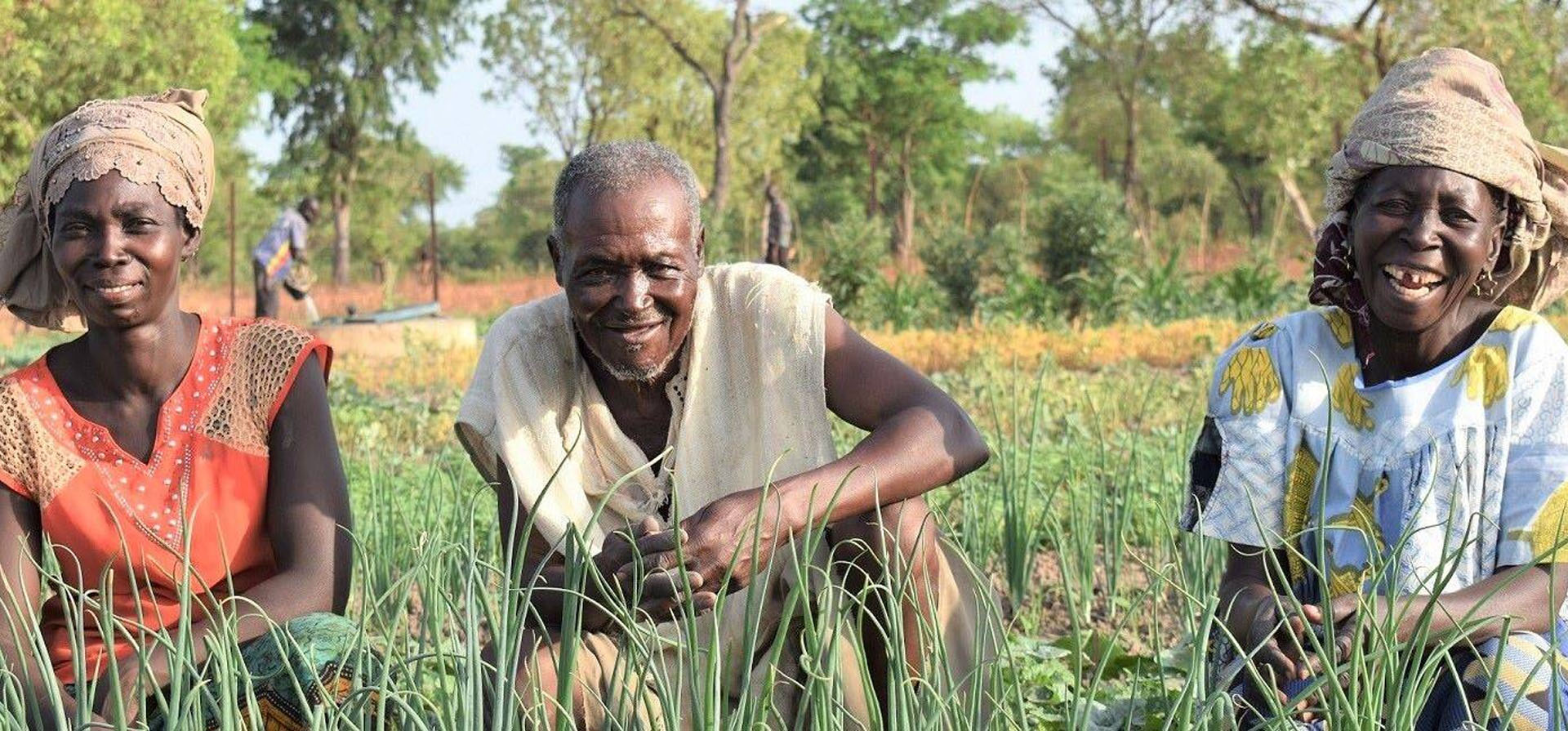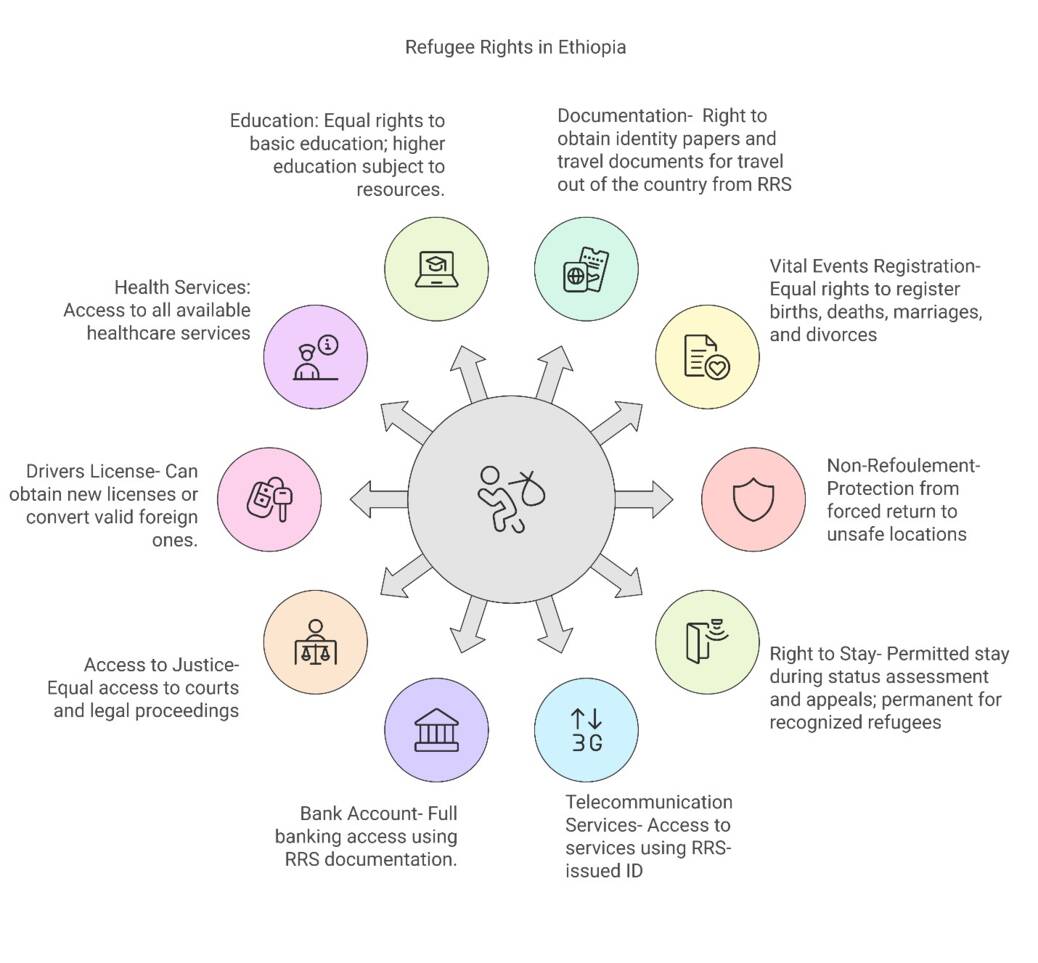Policy & Legal in Ethiopia

Policy & Legal in Ethiopia
On this page
Documentation
Refugees and asylum seekers have the right to obtain identity papers after being registered by the Refugees and Returnees Service (RRS). They are also entitled to obtain a travel document for the purpose of travel outside Ethiopia.
Vital Events Registration
Refugees and asylum-seekers have equal rights to register and get certificates of vital events such as birth, death, marriage, and divorce as Ethiopian nationals
Non-refoulement and Right to Stay in Ethiopia
Refugees and asylum seekers have the right to be protected from being sent back to a place where they would face threats to their life or freedom.
Asylum-seekers can stay in Ethiopia while the RRS assesses their status. If unsuccessful, they can stay until the appeal process is completed. Recognized refugees have the right to remain in Ethiopia.
Access to Health Services
Refugees and asylum seekers have the right to access the available preventive, promotive, curative, palliative and rehabilitative health services in Ethiopia.
Access to Education
All refugee children have the right to access pre-primary and primary education in the same manner as Ethiopian nationals. They can also access secondary, tertiary, TVET, adult, and non-formal education in accordance with the education policy of Ethiopia and subject to availability of resources.
Bank Account
Refugees and asylum-seekers have the right to open a personal bank account, deposit, transfer or withdraw money and obtain other banking services in accordance with relevant Ethiopian financial laws using identification documents issued by RRS. These include identity papers, travel document, pass permit, proof of registration, birth certificate, or any similar documents that attest to the identity of the bearer.
Access to Justice
Refugees and asylum-seekers have the same rights as nationals seeking justice through the courts or other competent bodies, including regarding bringing any justiciable matter to, and obtaining a decision or judgment by, the court or any other competent body with judicial power.
Access to Telecommunication Services
Recognized refugees and asylum-seekers can access telecommunication services using identification documents issued by the RRS.
Drivers Qualification Certification License
Eligible recognized refugees or asylum-seekers can obtain a new Ethiopian driver’s license using identification documents issued by RRS. Those with valid foreign or international driving licenses recognized by the Government of Ethiopia may also apply for an equivalent driver’s qualification certificate license.
Do refugees have the right to work?
Recently, Ethiopia has taken a significant step towards improving the livelihoods of refugees and asylum seekers by passing a new directive that allows them to work legally in the country. The directive, known as Directive No. 1019/2024, focuses on the “Right to Work of Recognized Refuges and Asylum Seekers” and aims to address the challenges faced by refugees seeking access to economic opportunities. Historically, refugees in Ethiopia have faced restrictions on their movement and employment, often confined to refugee camps due to a lack of legal work opportunities. The new directive underscores the Government’s commitment to provide access to employment and business opportunities for refugees. The implementation of this directive will be overseen primarily by RRS, in collaboration with the Ministry of Labor and Skills, the Investment Commission, the Ministry of Trade and Regional Integration, and the Ministry of Revenue. The new directive aims to transition recognized refugees and asylum seekers from reliance on humanitarian assistance to becoming productive and independent members of society, ultimately benefiting the local economy.
Do refugees have freedom of movement in Ethiopia?
The Government of Ethiopia issued in September 2019 a Directive No 01/2019 to Determine the Conditions for Movement and Residence of Refugees Outside of Camps (the Directive on Freedom of Movement).
Sudanese refugees in principle have freedom of movement and choice of residence in accordance with the Refugee Proclamation and the 2019 directive. They can freely move in and around in Ethiopia without a need for a pass permit. Refugees living in a refugee site may, however, need to obtain a pass permit to travel beyond the immediate vicinity of their site.
Do refugees have access to documentation?
The Government of Ethiopia, through RRS in partnership with National ID Program (NIDP) and UNHCR, launched an initiative to include refugees and asylum seekers into the Ethiopian Digital ID system, a crucial step toward their protection and inclusion into national systems. Aiming to facilitate refugees’ access to basic services, this initiative – currently in its pilot stage – is being rolled out with the issuance of digital refugee ID cards that feature a unique identification number called “Fayda”. Using biometric technology, the “Fayda” number issued by the NIDP, which will be printed on the refugee ID cards, will help in preventing double registration and duplicate ID cards issuance to the refugees and asylum seekers.
Following a pilot in Addis Ababa, the programme was expanded to the Amhara, Benishangul-Gumuz, and Somali regions. Digital IDs can help safeguard refugees against forced returns and arbitrary arrests, while granting access to essential services like healthcare, education, and mobile connectivity. By having a national ID card, refugees can open bank accounts, register businesses, and participate in economic activities. With proper identification, refugees and asylum seekers can join the labor market, access financial services, and work towards self-reliance.
This new refugee ID (with Fayda number) will allow refugees to access key services like obtaining a SIM card, healthcare, or school enrolment and will also help them improve their access to financial services, providing refugees with the opportunity to open bank accounts and engage in financial transactions. Refugee entrepreneurs can also formally register their businesses, contributing to the local economy.

